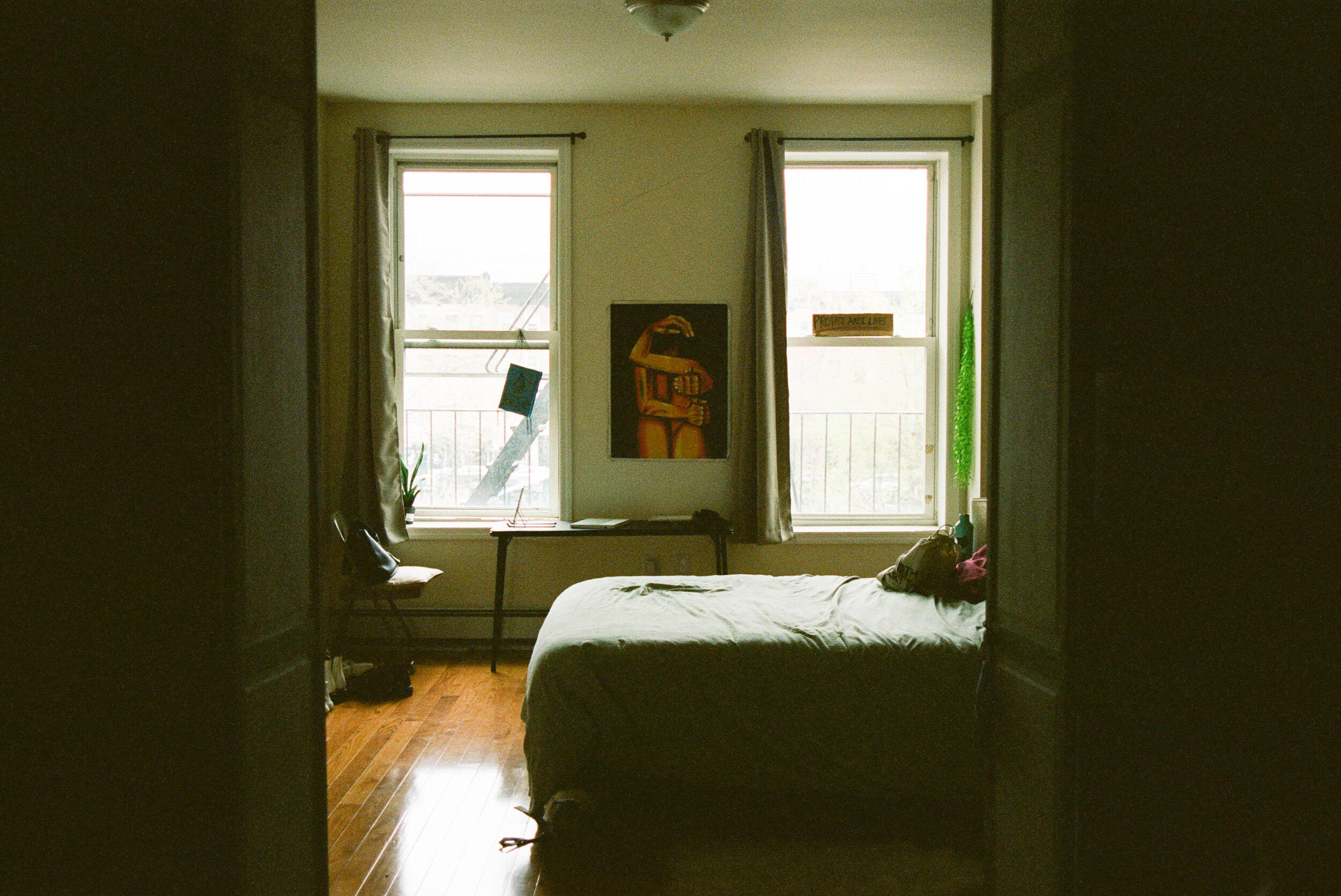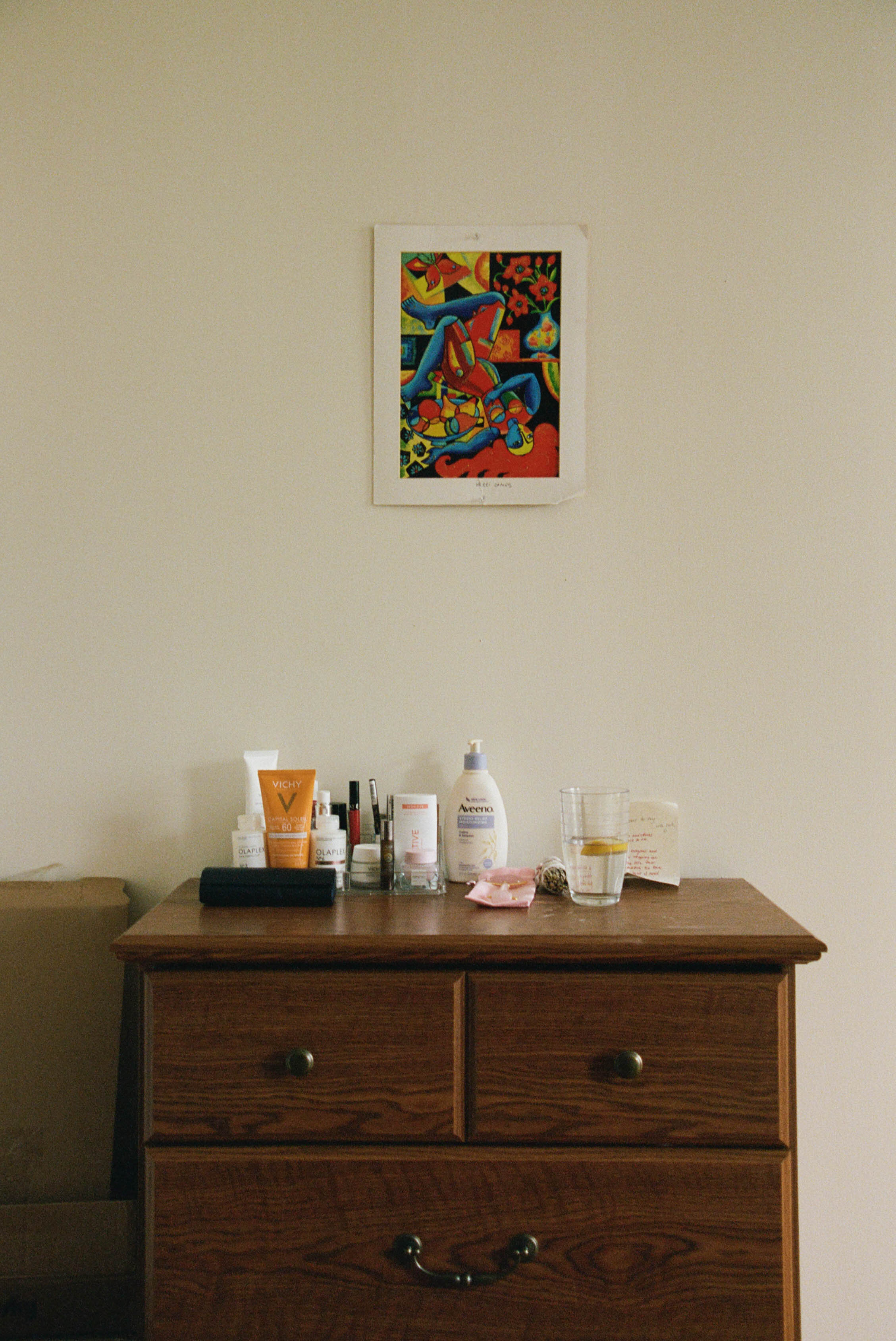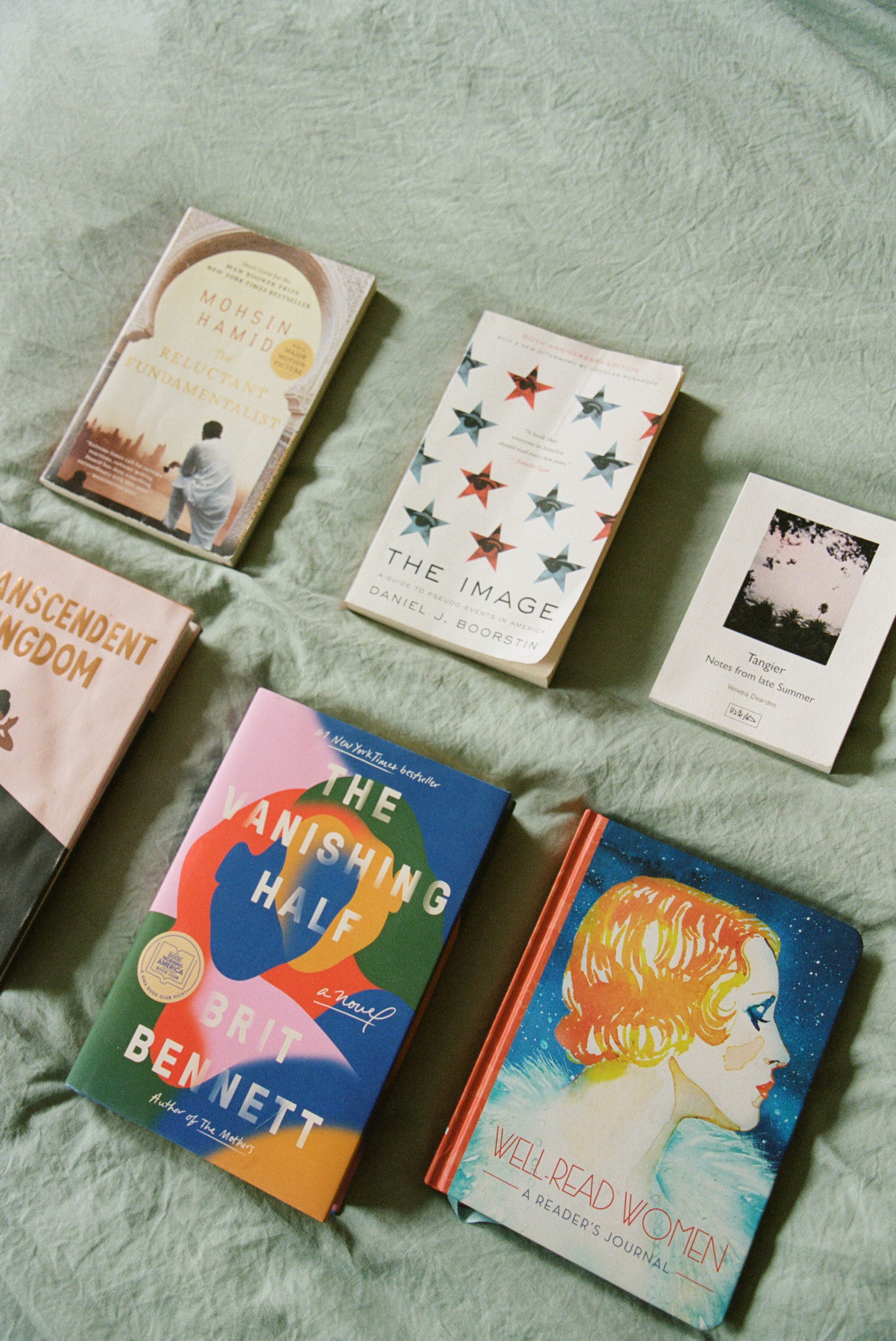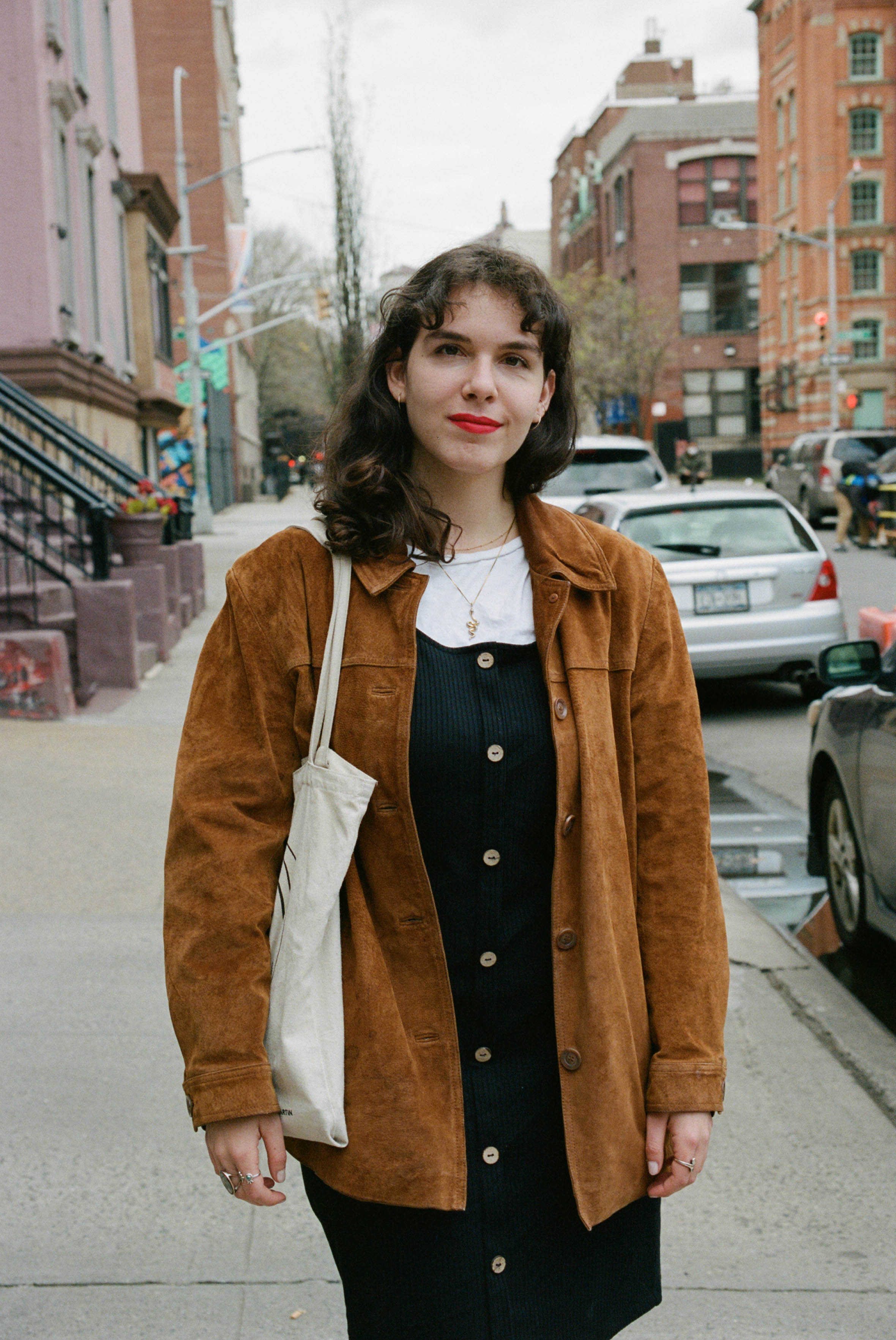Rebecca is a medical administrator who—like anyone who grew up in New York City—has an intense love for the city she’ll always call home. But she did a stint in California too, and her openness to the world and all we can experience in it shines through in this interview. Come the Fall, she’ll be enrolling in a Ph.D. in Clinical Psychology, a commendable endeavor by any measure, but her ambition doesn’t stop there. One day, Rebecca hopes to resume writing and maybe even acting—crafts she cultivated at her high school for the arts.
♫ Listen to rebecca’s playlist | ⌨ rebecca’s last google search
on her morning routine
I usually wake up between 6:30-7am. I have always been a morning person, even on the weekends I feel odd if I am not doing something by 8am (even if “something” is scrolling through social media...). Occasionally, I will meditate, do yoga, or work out. I listen to a podcast or audiobook as I do my skincare routine and get dressed, then make a coffee, matcha, or black tea. Work starts at 8am, so I am lucky to live within walking distance of the office.
on growing up in new york city
Growing up in New York City was such a privilege that I took for granted—both the upsides and downsides. I was born and raised in the Upper East Side, and while having Central Park and the Met within arm’s reach was a ludicrous fairytale, the vapid perceptions of success, beauty, and worth were not lost on me. My parents did not want to play into that at all—they almost didn’t let me watch Gossip Girl because they knew that some people I grew up with, and behavior I witnessed in the “private school scene” was pretty shocking.
I went to a high school for the arts, where I studied drama and got to collaborate with some of the most talented kids in the five boroughs—another NYC fantasy come true. Being around that much innovation was really the unique part of this experience, I think most people don’t get to experience this level of creative freedom unless they go to a conservatory or study acting in college. I got to live out my passions for four years, but it was also a discouraging environment where sexist, racist, and fatphobic criticism that would apparently help us out in the “real world” was pretty common.
Honestly, in many ways, I also had a “typical” coming of age experience—I fought with my parents sometimes, angstily listened to Taylor Swift (which I still do tbh), and got Chipotle after school with friends.
““The first job I remember wanting as a child was to be an astronaut, but passed on that once I learned about blackholes—good thing too, since I am dreadful at math. The career I actually remember wanting the longest throughout my childhood was to be a writer and actor.””
on what she’s learned being a part of the healthcare system
Although I do not provide any direct patient care, even seeing people go through their treatments has provided me with a greater perspective of the wants and needs of them and their caretakers. The physicians, nurses, and therapists I work next to have the highest standard of treatment, bedside manner, and really go above and beyond for the patients while coping with unimaginable stress. I also hold such admiration for my colleagues in administration, and learning what they do behind the scenes of treatment has been enlightening—for example, the process of financial coordination between patients, hospital staff, and insurance companies is way more of a song and dance than I realized.
I think there is a systemic lack of awareness of how incremental a role hospital administration plays in one’s treatment. The way average Americans are educated on the inner workings of healthcare must be changed, and healthcare is very clearly still considered a privilege in this nation. We discuss this inequity, especially for individuals from marginalized populations, among other topics in our department’s Equity and Inclusion committee. There is a long, long way to go, but I believe healthcare leaders are realizing that not only is it imperative to discuss these issues, but also necessary for combating racism, sexism, transphobia, and all biases.
on being an essential worker in new york through the pandemic
Since I am not a clinician, part of me believes I’m nowhere near a “healthcare hero” as people call hospital workers during the pandemic. I never saw the inside of an emergency room, I never had to hold a patient’s hand while they said goodbye to their families. That said, it’s even harder to admit to myself what I could be feeling is survivor's guilt. During the peak of NYC’s COVID infections, many hospital employees were redeployed from their administrative positions to essential workers. I went from working from home to doing manual labor at a medical supply warehouse, prepping supply deliveries to be sent to other hospital campuses. Since I was isolated from my friends and parents, I did appreciate that I could interact with people every day and do something meaningful, even though we were wary of getting infected. But I am lucky. I am safe, and now back to working my normal position and hours. And this is in NYC, so I must express how privileged I am for coping with all of this in one of the more socially cognizant environments. Being an essential worker during the pandemic really renewed my love for NYC as my home.
““My friends are all at different places in their lives, but they each carry a similar wisdom I feel privileged to be in the presence of. One of them works at a bakery and holds a Master’s Degree in Public Health. One of them just got into law school and is an advocate for survivors of domestic abuse and sexual assault. One of them feels professionally lost yet somehow manages to bring peace to everyone she meets. One of my friends speaks four languages and wants to bring them all into her music. One of them works in private equity and is secretly a talented poet. One of them passed away recently, but I still look to her unparalleled kindness and dedication to social justice for inspiration. These and all my other loved ones motivate me, because they love me for exactly who I am, but want me to be my best human self.””
on the randomness of life and deriving worth from her self
I think I will always be a little lost. I used to hate that about myself—I’m so indecisive, which I believe stems from my curiosity about everything. Life is so random, and I am still learning about myself as a person, so sticking to a specific path seems pretty terrifying. Even though I am not currently in the art field, I refuse to be someone who abandons all artistic pursuits in favor of a “real job.” I believe both can happen at once. You don’t necessarily have to give up a 9-5 job or risk personal security to pursue an artistic goal. I know I will write again someday, maybe even act again, but will only do so when I have something to say.
I think the pandemic has made everyone realize how dispensable we all are, and we are trying to get away from this notion that your career defines you. I just accepted an offer to join a Ph.D. in Clinical Psychology program, so I’m very excited to see what this experience may lead to, both personally and professionally. But jobs do not equal worth, which has sadly taken me a long time to realize. Life is short and I would like to put in as much effort toward being a good person as being a valuable coworker. All I do know is that in this life, in and out of the office, I want to make people feel validated and worthy while they cope with their individual struggles and systemic circumstances.
rebecca’s favorite podcasts and books
Like many in this pandemic, I’ve become quite the podcast enthusiast. I tend to lean toward the comically informative genre. I enjoy Daily Zeitgeist for political/pop culture content, Scam Goddess with Laci Mosley for escapism, and Talk Easy with Sam Fragoso for in-depth interviews. I love Jamie Loftus’s limited series Lolita, and My Year in Mensa.
I am trying to get back into reading—I was such an avid reader as a kid and would even read while walking. I’ve found audiobooks are very helpful with this. The Reluctant Fundamentalist is one of my favorites—Mohsin Hamid’s writing style is gorgeous yet accessible. I just finished Maybe You Should Talk to Someone by Lori Gottlieb, which details her own experience as a psychotherapist and as an individual with her own therapist. Transcendent Kingdom by Yaa Gyasi is a heavy and worthy read, and I am excited to read her other novel Homegoing. Know My Name by Chanel Miller is devastating but hopeful in its portrayal of her struggles, and it should be required reading.
on her beauty routine and style
I try to go by a “less is more” approach to makeup, but I’m excited to begin wearing lipstick again if and when masks are no longer needed in public. My favorite perfume has been Fresh’s Sugar Lychee since I was 13 years old and randomly received it as a gift. I love Vichy skincare, and their Vitamin C serum is my favorite product. I make sure to wear sunblock daily and get annual screenings for any potentially malignant spots.
I like to think of my style as comfortable with some edge—I just went through the NYC rite of passage of purchasing my first Doc Martens. Madewell jeans are wonderful for my body too. Growing up in a taller, curvier body made shopping a less than ideal experience. “Plus size” (although I hate this term) fashion has come a long way, but I had limited options for self expression. Plus, until recently, you were encouraged to hide your body with clothes rather than accentuate it if it did not fit the ideal. I try to abide by the motto that I should not fit my clothes, my clothes should fit me. My tattoos are also a favorite form of self expression—I have six and designed most of them, I will likely end up with more.
on exercise
For exercise, I try to do it intuitively—it took me a long time to not associate working out with self-punishment or trying to look a certain way. I think workouts should be fun, or else regardless of personal reasons it may not be maintainable. When I have lots of energy I enjoy challenging myself with new workouts, but on days when I’d rather just walk, stretch, or rest, I don’t judge myself.
rebecca’s favorite spots in new york
Coffee: I live in Harlem and love Frenchy Coffee NYC.
Hair: I found Nagi Hair salon on Mulberry Street by chance and love them—they also send me home with the products!
Park: I know it’s corny, but Central Park will always be my favorite. I have so many happy memories there, and every walk in the park brings unique encounters.
Restaurants: Teranga is one of my favorite lunch spots near work, it’s fast-casual West African. I cannot wait to go back to Tim Ho Wan for dim sum brunch, I miss their pork buns. Kaia is a South African wine bar that has my favorite grilled cheese sandwich. Their housemade bread and cocktails are also excellent. Kam Hing Coffee Shop has the best rice noodles for $6.00 and are known for their sponge cakes. Sugar Hill Creamery has a seasonal Guava Quesito flavor that I could eat daily. Hands down, they have some of the best ice cream.
Museums: The Guggenheim is a classic. I love their annual A Year With Children exhibit which is part of their Learning Through Art initiative and features art from children in NYC public schools.
images by clémence polès, interview by marina sulmona













